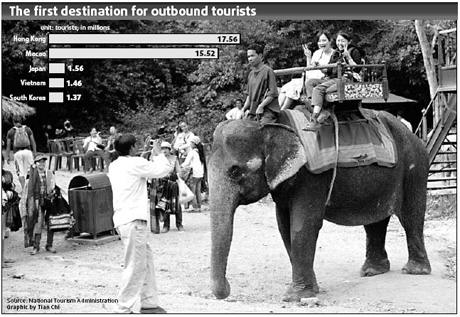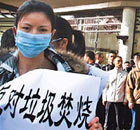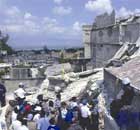Economy
Chinese travel abroad increases
By Xin Dingding (China Daily)
Updated: 2010-01-15 07:35
 |
Large Medium Small |
Mainland tourists spent $42 billion overseas last year
|
 Chinese tourists ride an elephant in Angkor Wat tourist area in Cambodia. [File photo] |
China's statistics from 2009 are expected to show its first deficit in tourism, due to a weak global economy and a strong travel incentive at home, a senior researcher said.
China Tourism Academy, the think tank for the country's tourism authority, said that mainland tourists spent some $42 billion in overseas destinations including Hong Kong, Macao and Taiwan last year.
At the same time, overseas tourists spent only $38 billion on the mainland, down by 7 percent year-on-year.
Though official statistics for 2009 are yet to be released, the academy estimated that the tourism deficit will stand at $4 billion in 2009 - the first ever tourism deficit in China.
"The deficit in tourism service trade is a new sign saying that China is turning into a notable tourist source market, in addition to being an important destination," Dai Bin, deputy head of China Tourism Academy, told China Daily.
The deficit will enable China to have more say in the global travel market, and also help lift the pressure on China for renminbi appreciation, he said.
Some 47 million trips were made by mainland tourists to overseas destinations in 2009, up 3 percent year-on-year, the academy estimated.
In contrast, 126 million overseas tourists visited the mainland last year, down by 3 percent year-on-year, it estimated.
Though the inbound tourists far outnumbered the outbound, apparently mainland tourists, with swelling wallets and eagerness for shopping, have spent much more overseas.
"Chinese tourists have a different spending concept from others. They could endure staying at a three-star hotel and eating at a not-so-good restaurant, but would never go back home empty-handed," said Zhang Wei, general manager of the outbound department with the China International Travel Service head office.
Also, since many imported goods are sold on the Chinese mainland at much higher prices, many tourists shop for expensive watches, clothes and cosmetics overseas, she said.
Beijinger Gao Xuenan, on her trip to Europe last month, spent some 13,000 yuan ($1,900) on a Louis Vuitton bag and a purse, and spent another 2,000 yuan on a Burberry scarf.
"The prices of these goods are much higher in Beijing. The scarf, sold at more than 4,000 yuan, is even out of stock in Beijing. I kind of feel I would suffer a loss if I don't buy them in Europe," she said.
A survey by AC Nielson in 2008 said each Chinese tourist spent an average $987 per trip. Those travelling to Europe spent an average $1,781.
But foreign tourists usually do not shop for such expensive items in China, she said.
Besides, the global economic downturn has made many foreign tourists slash their China shopping budgets, said Dun Jidong, spokesman for the China Travel Service.
"But (the economic meltdown) had less impact on mainland tourists, who traveled with confidence in China's economy," he said.
The number of Beijing tourists joining outbound tour groups through China Travel Service still grew at a double-digit pace last year as usual, he said.
From another view, after years of promoting China as a tourist destination, the wealthy foreigners who used to be the primary group visiting the Chinese mainland have been replaced by ordinary tour groups and backpackers, who spent less in China, Dai Bin with the academy said.
But the average GDP per capita has hit $3,000 in China, "a level that industry experts agree sends a signal that the country is entering a stage of explosive growth in travel consumption", he said.
The academy forecast that 54 million trips will be made by mainland tourists to overseas destinations in 2010, an increase of 15 percent year-on-year.
"Compared to the average western tourist traveling at least seven times a year, Chinese tourists travel only once a year. We have a market with huge potential," he said.













